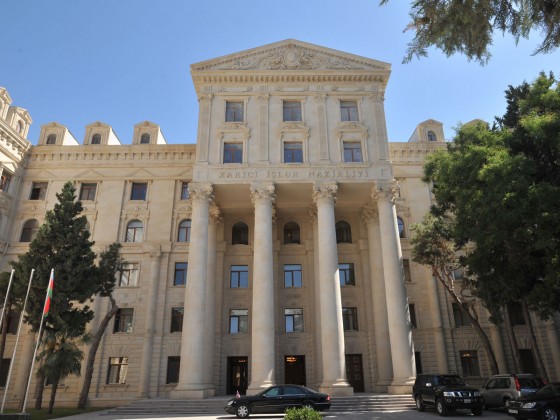
The Armenian leadership must not forget that the Armenians have no relation to the South Caucasus from the archaeological, ethnographic and anthropological points of view, Hikmet Hajiyev, spokesman for the Azerbaijani foreign ministry, told Trend Oct. 23.
The Armenians, resettled to the South Caucasus after the collapse of the Russian Empire, created something resembling a state on historical Azerbaijani lands.
“It seems that the Armenian leadership did not forget the statement that Nagorno-Karabakh is an integral part of Armenia made September 27, 2015,” he said. “This statement once again proves the occupation and annexation of the Azerbaijani territories by Armenia.”
Hajiyev said that it would be appropriate to remind the leadership of Armenia, distorting the essence of the four resolutions, adopted by the UN Security Council that they once again support the territorial integrity and sovereignty of Azerbaijan.
“These resolutions confirm that Nagorno-Karabakh is an inseparable part of Azerbaijan and call for immediate, unconditional and full withdrawing of the occupying forces from all occupied territories,” he said.
"The resolutions also emphasized the inadmissibility of violating the internationally recognized state borders and conquering the territories by force,” he said. “According to the mandate of the OSCE Minsk Group, the activity of the Minsk Group must be based on these resolutions in accordance with the document adopted March 23, 1995.”
Hajiyev also said that the principle of non-use of force and a threat of force became the political speculation on the part of Armenia.
"Armenia used force against Azerbaijan and as a result it occupied 20 percent of Azerbaijani territory,” he said. “The international community and the OSCE Minsk Group co-chairmen called for observing the principle of non-use of force and a threat of force. First of all, Armenia must fulfill this requirement as a country that has occupied other country’s territory."
Armenian President Serzh Sargsyan made a statement at the opening ceremony of the third international forum of graduates of Moscow State Institute of International Relations (MGIMO). He once again criticized Azerbaijan, accusing it of rejecting the OSCE Minsk Group co-chairmen’s proposals on the Nagorno-Karabakh conflict settlement.
The conflict between the two South Caucasus countries began in 1988 when Armenia made territorial claims against Azerbaijan. As a result of the ensuing war, in 1992 Armenian armed forces occupied 20 percent of Azerbaijan, including the Nagorno-Karabakh region and seven surrounding districts.
The two countries signed a ceasefire agreement in 1994. The co-chairs of the OSCE Minsk Group, Russia, France and the US are currently holding peace negotiations. Armenia has not yet implemented the UN Security Council’s four resolutions on the liberation of the Nagorno-Karabakh and the surrounding regions.
Edited by CN
Trend
